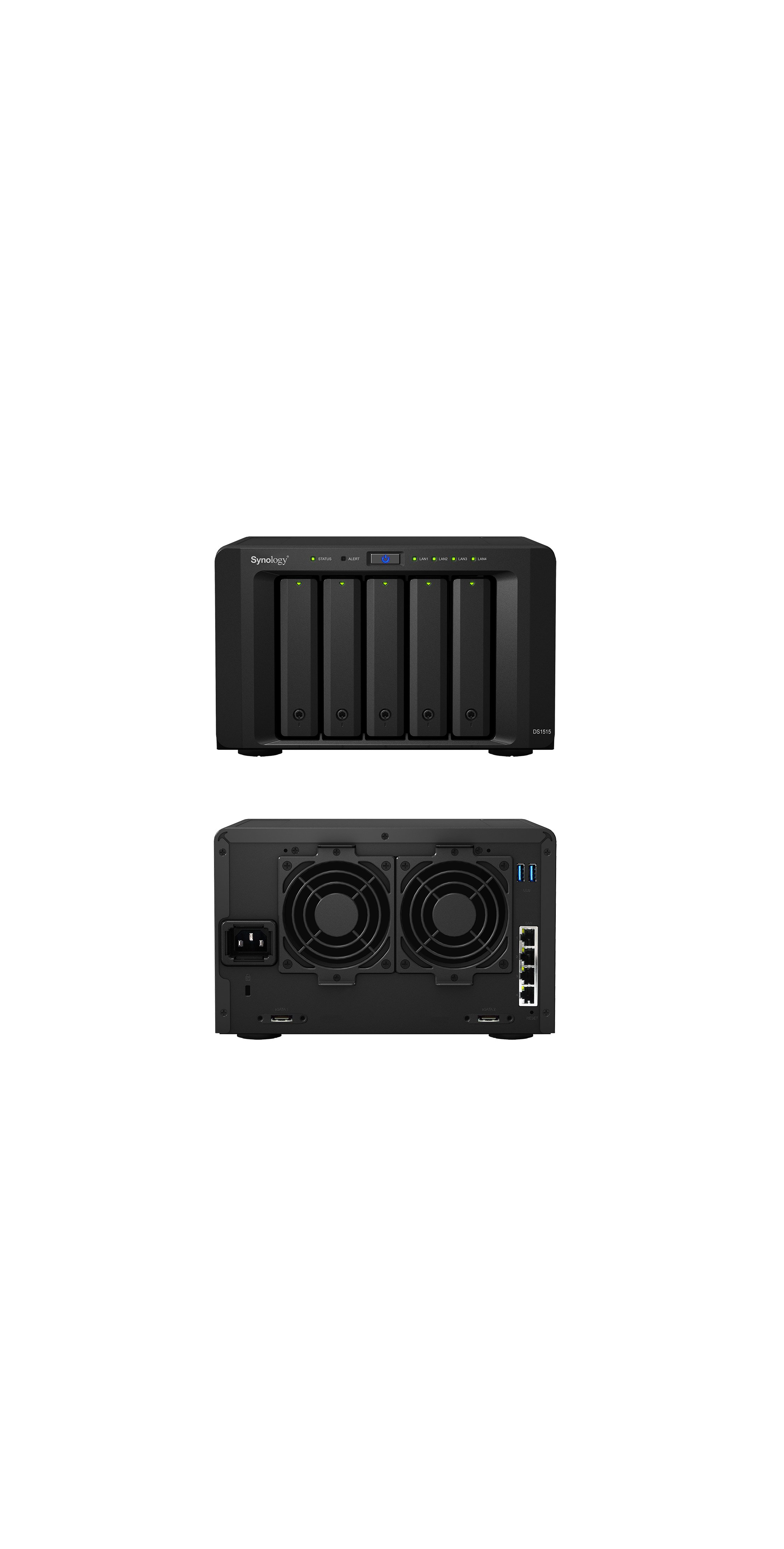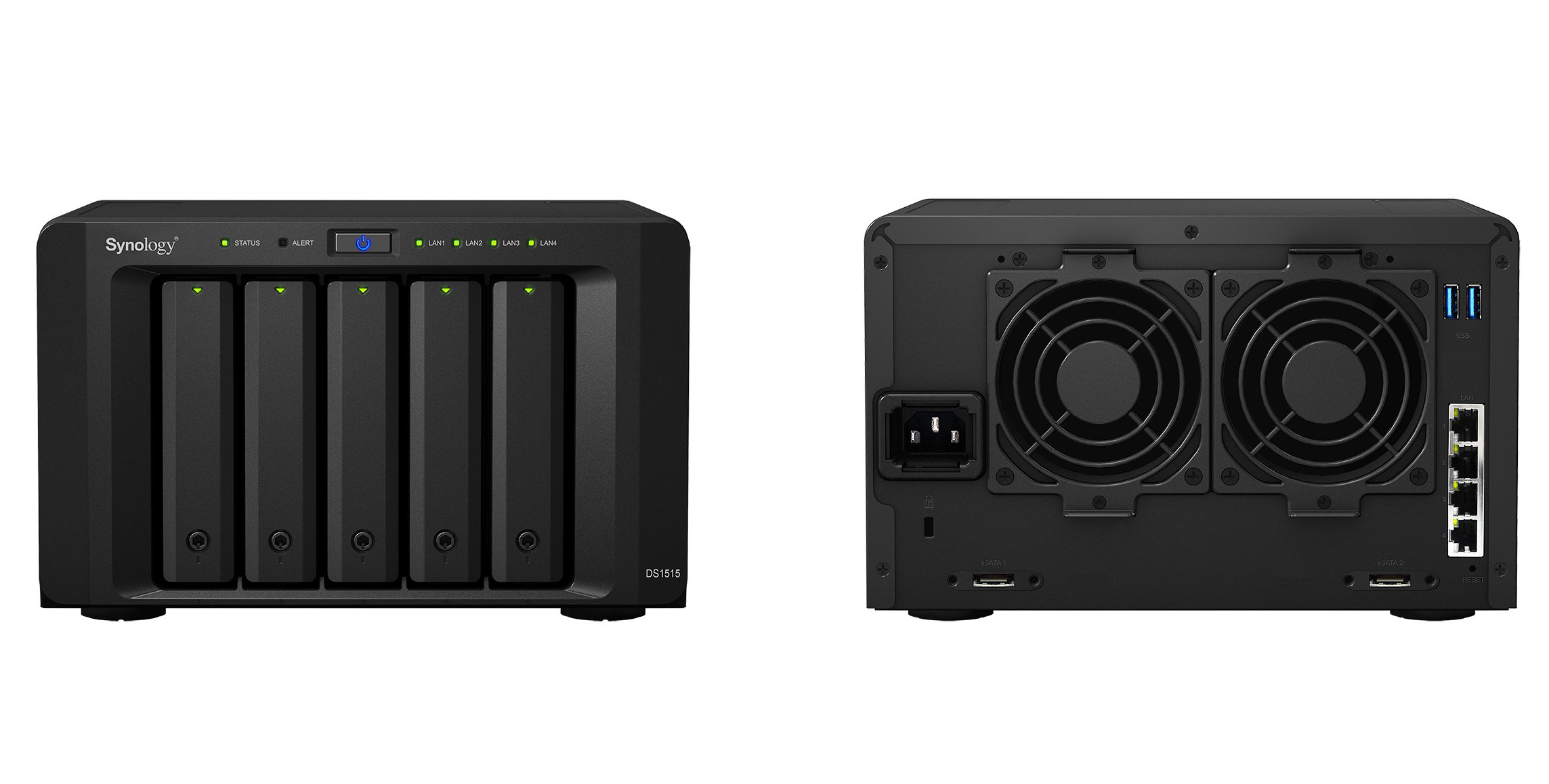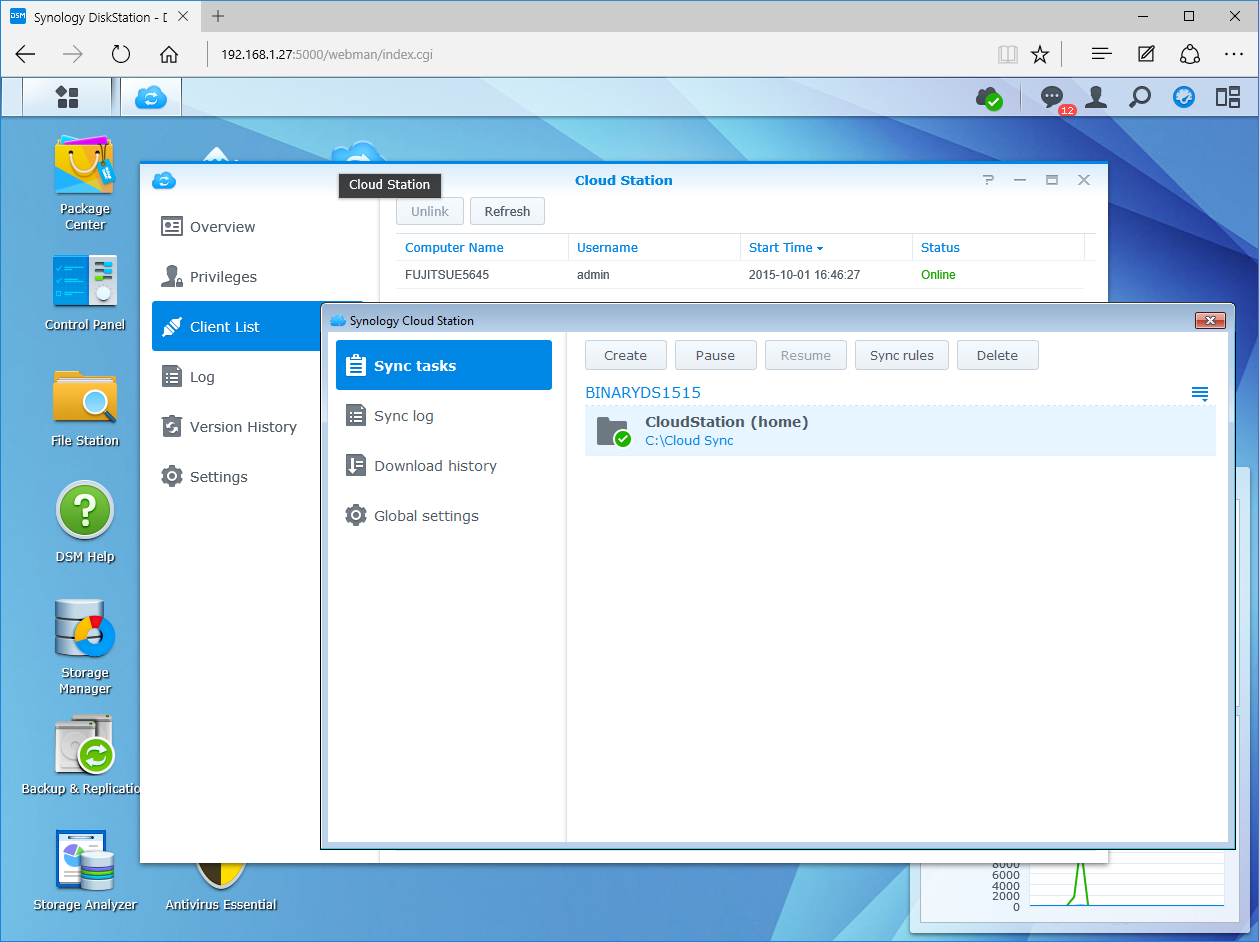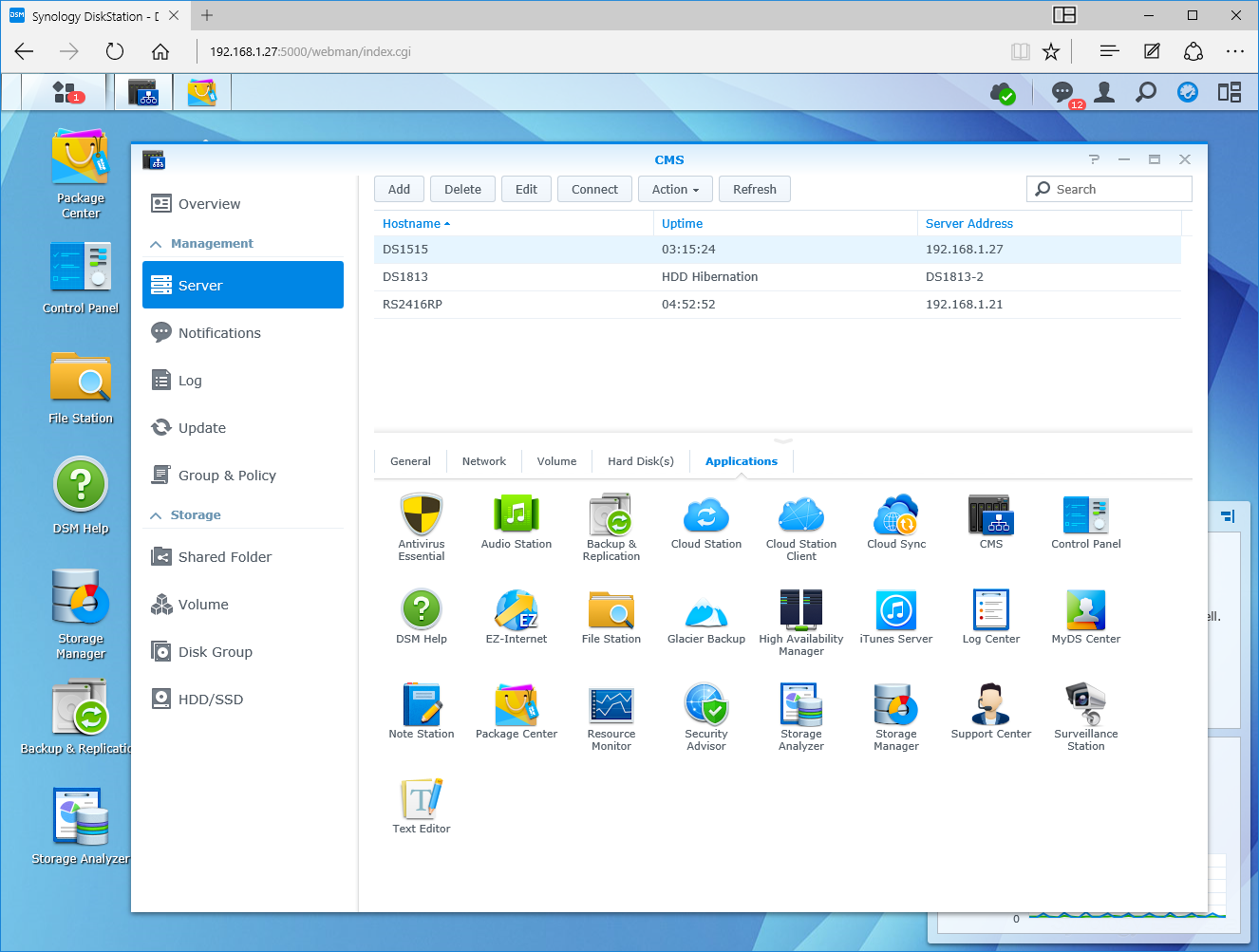Synology DiskStation DS1515 review
Synology launches a cheap Amazon-powered NAS appliance

The DS1515 is good value, well-built and packed with useful software features but the DS1515+ is better suited to heavy workloads and encryption duties
-
+
Good value; Quiet; Impressive storage features; Expansion potential
-
-
Only costs slightly less than the Plus version and doesn’t perform as well under load

Synology has been busy developing its Value series of small business NAS appliances and the DS1515 is the first 5-bay desktop model to join the family. It's one of three appliances in this range to use an Annapurna Labs Alpine CPU which Amazon thought was so good it acquired the company earlier this year.
It's sold as a lower cost alternative to Synology's DS1515+ but is only around 48 less. In this review we put them both through their paces in the lab to tell you whether these savings are worth making.
The DS1515 is powered by a quad-core 1.4GHz Alpine AL-314 ARM-based chip partnered with 2GB of DDR3 which can't be upgraded. The DS1515+ has an x86-based quad-core 2.4GHz Intel Atom C2538 and its base 2GB of DDR3 can be increased to 6GB.
While they both use almost identical solid matt-black metal casings, the DS1515 has two USB 3 ports half that of the DS1515+. The chassis employs two cooling fans at the back and during testing we found these to be very quiet making either model a good choice for SOHO environments.
Deployment and expansion
Along with four Gigabit Ethernet ports, the DS1515 also has two eSATA ports which support Synology's DX213 2-bay and DX513 5-bay expansion units. With 8TB drives on the certified list, you can push raw capacity to an impressive 120TB.

The DS1515 can be expanded up to 15 drives using two of Synology's DX513 external expansion units
For testing, we loaded up a quartet of 4TB WD Red NAS hard disks. Synology's tool-free carriers simplify the process as we just removed the carrier side clips, dropped the disks in, reattached the side clips and slotted them back in.
With Synology's discovery web portal on the case, initial deployment is very swift. It found the appliance on the lab network, loaded the base DSM firmware, updated it to the latest version and had it ready to go inside 20 minutes.
From the Storage Manager app, we chose a single SHR (Synology Hybrid RAID) storage pool using all drives. You can opt for classic RAID arrays, but SHR is more flexible as it allows disks of different sizes to be mixed together without taking a hit on capacity and it supports single and dual-drive redundancy.
Performance differences
The DS1515 delivered some good results in our performance tests and can clearly cope with the demands of light to medium storage duties. Using a share mapped to a Windows Server 2012 R2 server, we saw drag and drop copies of a 25GB test file return sustained read and write speeds of 112MB/sec the same as the DS1515+.

It handled our backup test well with a 22.4GB test folder containing 10,500 small files copied down at an average of 83MB/sec. The DS1515+ achieved a slightly higher 87MB/sec for this test.
The Alpine processor has an integral AES-NI encryption engine but it's not as efficient as the Atom C2538. Copying our 25GB test file to an encrypted share on the DS1515 returned 63MB/sec whereas the DS1515+ mustered a higher 82MB/sec.
We increased the pressure by mapping shares to four Xeon E5-2600 servers each with dedicated Gigabit Ethernet links to the appliances. Running Iometer on each share saw cumulative read and write speeds for the DS1515 of 432MB/sec and 366MB/sec which improved noticeably to 452MB/sec and 430MB/sec for the DS1515+.
DSM features
Whichever model you choose, you won't be lacking for software features as Synology's DSM is packed to the gills with them. Data protection tools are in abundance and we used the Backup & Replication app to secure data from one local share to another and externally to an Rsync compatible NAS appliance.
The same app supports backup to Amazon S3 and Microsoft Azure plus there's a separate one for Amazon Glacier which worked fine with our account. The Cloud Sync app has been updated so along with Dropbox, Google Drive and OneDrive, it now supports Amazon Cloud Drive and Google Cloud Storage.
Workstation backup is handled by the Cloud Station app which allowed our Windows desktop users to connect to the DS1515 using its QuickConnect ID and sync selected local folders with the appliance in real-time. The only data protection feature you won't see is BTRFS snapshots as this file system is only available on Synology's higher-end appliances such as the RS18016xs+.

We used the Cloud Sync app to backup data on our Windows desktops to the appliance and keep them in sync
We tested the Cloud Station Client app and were able to sync data on the DS1515 in real-time with a paired folder on the lab's DS1813+. Both systems could also be centrally monitored from the DS1515 using Synology's CMS app which provides a handy console for viewing their status.

The CSM app allowed us to monitor three Synology appliances from a single console
Conclusions
If you're planning on using encrypted shares and forecast a high storage workload such as multiple workstation backup and replication to other appliances then we recommend the higher-spec DS1515+. It's worth spending that little bit extra as it'll provide you with noticeably better performance.
Nevertheless, the affordable DS1515 is a tempting proposition for small businesses that want a low-cost network storage repository with room to grow. It runs the same DSM software as the DS1515+ so features and apps are equally impressive and it's just as well built.
Verdict
The DS1515 is good value, well-built and packed with useful software features but the DS1515+ is better suited to heavy workloads and encryption duties
Chassis: Desktop
CPU: 1.4GHz Annapurna Labs Alpine AL-314
Memory: 2GB DDR3
Storage: 5 x 2.5/3.5in SATA hot-swap drive bays
Array support: RAID0, 1, 10, 5, 6, SHR, JBOD
Network: 4 x Gigabit Ethernet
Expansion: 2 x eSATA
Other ports: 2 x USB 3
Management: Web browser
Warranty: 5-year limited
Get the ITPro daily newsletter
Sign up today and you will receive a free copy of our Future Focus 2025 report - the leading guidance on AI, cybersecurity and other IT challenges as per 700+ senior executives
Dave is an IT consultant and freelance journalist specialising in hands-on reviews of computer networking products covering all market sectors from small businesses to enterprises. Founder of Binary Testing Ltd – the UK’s premier independent network testing laboratory - Dave has over 45 years of experience in the IT industry.
Dave has produced many thousands of in-depth business networking product reviews from his lab which have been reproduced globally. Writing for ITPro and its sister title, PC Pro, he covers all areas of business IT infrastructure, including servers, storage, network security, data protection, cloud, infrastructure and services.
-
 ‘Phishing kits are a force multiplier': Cheap cyber crime kits can be bought on the dark web for less than $25 – and experts warn it’s lowering the barrier of entry for amateur hackers
‘Phishing kits are a force multiplier': Cheap cyber crime kits can be bought on the dark web for less than $25 – and experts warn it’s lowering the barrier of entry for amateur hackersNews Research from NordVPN shows phishing kits are now widely available on the dark web and via messaging apps like Telegram, and are often selling for less than $25.
By Emma Woollacott Published
-
 Redis unveils new tools for developers working on AI applications
Redis unveils new tools for developers working on AI applicationsNews Redis has announced new tools aimed at making it easier for AI developers to build applications and optimize large language model (LLM) outputs.
By Ross Kelly Published
-
 Google layoffs continue with "hundreds" cut from Chrome, Android, and Pixel teams
Google layoffs continue with "hundreds" cut from Chrome, Android, and Pixel teamsNews The tech giant's efficiency drive enters a third year with devices teams the latest target
By Bobby Hellard Published